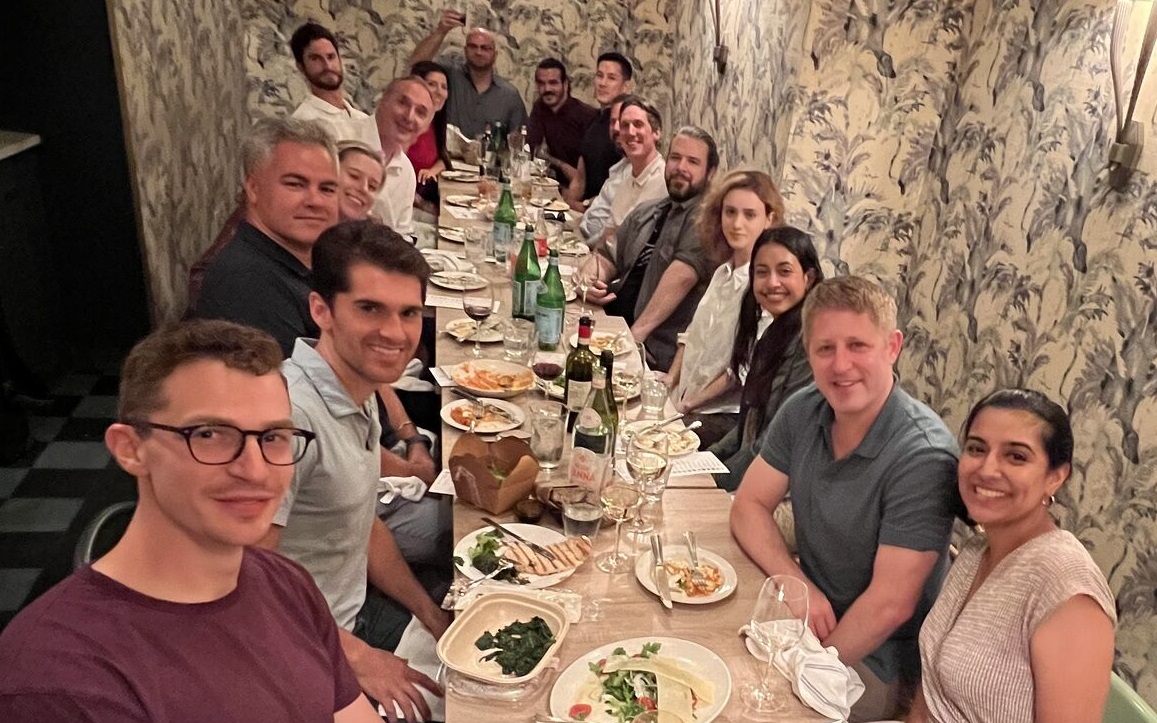We had the privilege of hosting an in-person round table in partnership with FFVC in New York. Our guests included Founders, Venture Capitalists, and VPs of Tech and Data from established brands in NYC state. They each shared valuable insights on how to build international teams and enhance team performance, and the steps they take to retain top talent.
We also discussed some of the AI tools and ways to drive wider team efficiencies and cut down on the more manual tasks that can easily consume much of a founder’s time.
🏡What are the Benefits and Limitations of Hybrid vs. Remote Work
The focus of our conversation was centered on fostering a strong company culture and creating a productive work environment. We discussed how Remote Work compares to Hybrid/On-site setups in achieving these goals.
Most of the group agreed that creating a fully remote culture can be challenging, especially for junior teams.
While some segments of the workforce prefer remote work and resist returning to the office, it was unanimously agreed that for those at an early career stage, the advantages of face-to-face interactions, hands-on coaching, and natural interpersonal skill development far outweigh the impact of occasional office commuting.
One major benefit highlighted by many founders is that remote work allows them to hire the best candidates without being limited by geographical constraints or office proximity.
For more technically oriented teams already accustomed to remote work, some founders suggested engaging activities such as “weekly code presentations” and “hackathons” to keep team members engaged and visible to the broader team.
The overarching feedback regarding a remote workforce was how hard it was to foster a strong culture and build strong interpersonal relationships. This is mainly due to the structured nature of remote interactions, which tend to focus on work-related discussions, minimizing the informal “getting to know you” chats often associated with office environments.
In essence, remote work excels in attracting top candidates, but it may lead to lower employee retention over time.
🤖Using AI and modern communication tools to help drive wider team efficiencies and what part can ChatGPT play in this.
We all reached a consensus: AI and modern communication tools, when used correctly, significantly enhance team efficiency, especially for remote setups.
First things first, acknowledge the array of tools available and take the time to pick the right ones for your business. Speaking to other companies and founders, along with trying out demos, is the best approach.
Remember, measuring instant ROI in the early days of using any tool, including AI, can be tough. Trust the process and allow time for the tool to show its impact.
Those who’ve tried ChatGPT for manual, admin-heavy tasks acknowledge its appeal, but some are yet to fully grasp its extensive power and functionalities.
Internally, ChatGPT can really help save time, from ad-hoc data quality checks in large datasets or codes to more basic tasks like translating and summarizing lengthy texts, when used correctly, ChatGPT should be the go-to tool in your team.
While AI hasn’t fully taken over talent acquisition yet, everyone agrees that AI and ChatGPT will soon play a key role in driving efficiencies in attracting top talent.
👷♂️👷♀️How to Build and Sustain a Strong Culture in a Globally Dispersed Team
It was widely agreed, that with the rapid rise in the adoption and use of instant messaging and video conferencing tools (courtesy of covid), we shouldn’t underestimate the power, and benefit of building a team internationally.
Here are some of the steps companies can take to put themselves in the best possible position to attract, hire and ultimately retain a best-in-class international team.
- Set milestones and encourage occasional in-person gatherings to facilitate face-to-face connections among team members whenever feasible.
- Organize out-of-the-office events focused on non-work-related activities to foster social team building.
- Arrange impromptu “surprises” for your remote colleagues. A great example, was one Head of Analytics who uses Pizzatime to send tasty treats to his remote dev team.
- Where possible, leaders must invest time in connecting with their international colleagues on both a professional and personal level. A founder’s example of living and working in Tel Aviv for six months was particularly inspiring.
- As teams grow, consider becoming more remote-friendly for senior members. However, it’s universally agreed that junior employees should spend time in the office to assimilate the company culture, learn best practices, and benefit from interactions with others.
- For startups seeking diverse talent, establishing geographical hubs allows team members to interact face-to-face, fostering a sense of participation in the company’s life.
- When opening hiring to a global talent pool, ensure that new hires align with the company’s values and culture. Regular “remote socials” can help new team members feel included and prevent long-term retention issues.
A huge thank you to everyone that took time out of their evening to contribute to such a great discussion and to our partners at FFVC for organizing!

